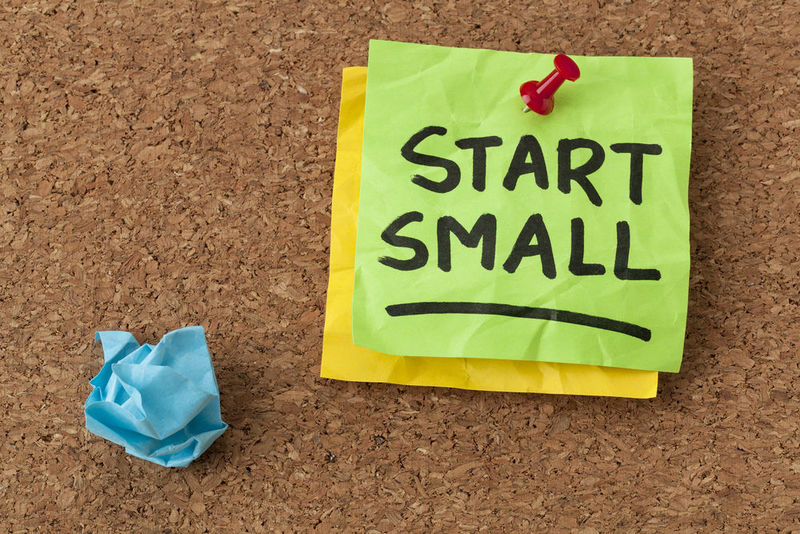Overcoming Self-Doubt: 5 Things Every Muslim Needs to Know

Praise be to Allah.
Remember those times when you had a plan or a goal but somehow, you did not follow through? When you had an idea but you were hesitant to speak, when you were showered with praises but felt undeserving or when you felt like you will never excel? There is a voice in your head that constantly reminds you of how unworthy you should feel in doing anything or for anyone. These whispers lead us to self-doubt either in our own capabilities or self-worth – or both.
How does Islam guide us in overcoming this? Here are 5 key things for you to know how to start the change.
1. Self-Doubt is NOT A Sign of Weak Faith

When caught up in the whispers of self-doubt, we tend to ask if it stems from our lack of love or devotion to Allah s.w.t. Sometimes, we question ourselves if we are devoting too much time on worldly matters, if Allah accept our deeds, or if we are good enough as Muslims. As human beings, we are not precluded from having introspective questions. Prophet Musa a.s also struggled with emerging questions when instructed by Allah s.w.t to meet Pharaoh. Prominent companions of Prophet Muhammad s.a.w too, experienced episodes of self-doubt.
The Prophet’s companions, Abu Bakar and Hanzalah r.a, had questioned themselves if they were being true Muslims or hypocrites when they only had undivided attention to matters pertaining to the Hereafter in the presence of the Prophet s.a.w.
Hanzalah r.a said, "O Messenger of Allah, when we are in your company and are reminded of Hell-fire and Jannah, we feel as if we are seeing them with our own eyes, but when we go away from you and attend to our wives, children, and business, much of these things go out of our minds." Rasulullah s.a.w replied, "By Him in Whose Hand is my life if your state of mind remains the same as it is in my presence and you are always busy in remembrance (of Allah), the angels will shake hands with you in your beds and in your roads; but Hanzalah, time should be given (to the worldly affairs) and time should be devoted (to prayer)". The Prophet reiterated this thrice.
(Narrated by Imam Muslim)
It is a good sign to have these questions as it reflects our state of Taqwa and earnest efforts to strengthen our Iman (faith). This episodic feeling is natural given that, as human beings, our faith fluctuates. It increases and decreases. Hence, in the Hadith above, the Prophet s.a.w. drew a comparison to the angels – whose faith neither increase nor decrease. Hanzalah questioned his faith in fear of falling into the same category as the hypocrites when, in truth, he is amongst the companions of the Prophet s.a.w whom Allah s.w.t has witnessed their resilient faith and given pleasure to.
“No one fears hypocrisy but a believer, and no one feels safe from it but a hypocrite.”
(Imam Hasan Al-Basri)
On a different note, we should not forget our commitment to daily activities, work, time spent with family and hard work to strive for excellence. In fact, with the right intention which is to receive Allah’s pleasure, these responsibilities are also forms of worship. Worship is not only in the form of prayers. We should not neglect our affairs here in a bid to reap benefits in the Hereafter.
So, know that self-introspection and the fear you have is good but do not overthink or dwell on it. Allah, The All-Merciful, knows you are trying!
2. Start by Changing Your Mindset

There are many sources of self-doubt, namely: Self-Fulfilling Prophecy, Self-Sabotage, the Imposter Syndrome and Lack of Self-Kindness. Most of the time, we fall prey to the whispers of self-fulfilling prophecy.
Self-fulfilling prophecy starts with the “I can’t” belief, which influences our expectations of the outcome. The subpar expectation shapes our behaviour that influences the results. These dissatisfactory results reinforce our initial sour belief. This tells us that our belief is the locus. It affects our body; how we speak to ourselves repeatedly affects our neural pathways. When we internalise our belief, our brain picks up the message and translate it into actions. Hence, our behaviour produces the “expected results” central to what we believe.
So, the first step to change is to change your mindset. It brings a ripple effect to your actions, expectations and outcome. Simply changing your behaviour is unlikely to give you any long-term results as you cannot lie behind your emotions and thoughts. It is also insufficient to merely pray and seek Divine assistance from Allah s.w.t without putting the right effort. The positive belief needs to come from your own self. Accompany your prayers with the will and effort to change. In the Qur’an Allah says,
“ إِنَّ اللَّهَ لَا يُغَيِّرُ مَا بِقَوْمٍ حَتَّىٰ يُغَيِّرُوا مَا بِأَنفُسِهِمْ”
Verily, Allah will not change the (good) condition of a people as long as they do not change their state (of goodness) themselves (by committing sins and by being ungrateful and disobedient to Allah)
(Surah Ar-Ra’d 13:11)
Change how and what you think of yourself. For example, it is not about how smart you are but what you are smart about. If you are unable to see your uniqueness or strengths, ask your family and close friends. Accept and acknowledge your worth. You will be amazed!
3. Time to Re-Strategize: Start Small!

No one is able to overcome self-doubt overnight. It is a process that takes time, effort, retrospection and self-love. When your desire to change comes from within, honour that feeling with self-respect. Do not sabotage yourself by giving yourself too much to change over a little time.
Rasulullah s.a.w said,
" سَدِّدُوا وَقَارِبُوا، وَاعْلَمُوا أَن لَنْ يُدْخِلَ أَحَدَكُمْ عَمَلُهُ الْجَنَّةَ، وَأَنَّ أَحَبَّ الأَعْمَالِ أَدْوَمُهَا إِلَى اللَّهِ، وَإِنْ قَلَّ "
"Do good deeds properly and moderately and know that your deeds will not make you enter Paradise, and that the most beloved deed to Allah is the most regular and constant even if it were little."
(Sahih Al-Bukhari)
Break your ultimate goal into smaller goals to realistically make the change. Achieving these little milestones keeps you motivated and inspired to sustain the momentum until you reach your goal. The risks are great but the reward is greater. Bottom line is to make small but meaningful changes
4. Give Yourself A Chance.

Take a step back and look at your life. You see a constant pattern that has not changed. The reason is that you yourself have yet to change. Self-doubt often makes us rationalise a situation to fit our emotional state. We make excuses that only create mental barriers. Reflect on your objectives and ask yourself, “what have I not done?” Take the chance to make things better for yourself. Bring yourself closer to Him.
Supplication when facing hardship
اللَّهُمَّ لا سَهْلَ إِلاَّ ما جَعَلْتَهُ سَهْلاً، وأنْتَ تَجْعَلُ الحَزْنَ إذَا شِئْتَ سَهْلاً
O Allah, there is no ease except in that which You have made easy, and You make the difficulty, if You wish, easy
(Narrated by Imam Ibn Hibban)
We change when our beliefs change. Adopt a growth mindset to learn to appreciate the small progress. Your challenges are unique to you - only you know the amount of effort and sacrifices you put to improve your situation. You will slowly learn to see His wisdom and the manifestation of His Mercy to you. The journey you will embark on is not only good for you but it will bring you closer to Him.
5. Appreciate What He has Given You

There are two types of social comparison: upward and downward comparisons. Typically, we make upward comparisons where we measure ourselves – our capabilities and self-worth, with those that we perceive possess greater qualities. This is a good mindset as it keeps us motivated to improve ourselves.
However, in return, we do not wish to become ungrateful Muslims for failing to see and appreciate the blessings He has given us. There are times when comparing ourselves to our own peers is helpful so that we recognise our own unique traits, discover and acknowledge the blessings and mercy He has showered upon us. Abu Hurairah narrated that the Messenger of Allah s.a.w. said:
“Look at those who are beneath you and do not look at those who are above you, for it is more suitable that you should not consider as less the blessing of Allah.”
(Narrated by Imam Ibn Majah)
We are created by The Creator who is Beautiful and loves beauty. Each and every one of us is created differently. Find that gem in you. As you embark on this quest, know that you are also renewing and constantly bettering your relationship with Allah s.w.t.
And Allah knows best.

